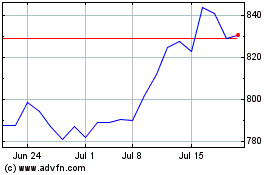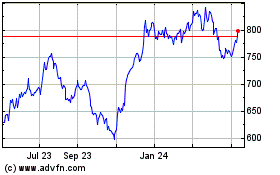BlackRock Unit Gets Approval to Take Russia-Linked Firm's Stake in Cybersecurity Company
August 20 2019 - 6:03PM
Dow Jones News
By William Louch and Dawn Lim
A national-security panel that oversees foreign investment in
U.S. businesses approved the transfer of a stake in cybersecurity
company Cofense Inc. from a Russia-linked private-equity firm to
funds managed by BlackRock Inc.
People familiar with the matter said the Committee on Foreign
Investment in the U.S., known as Cfius, gave its approval to the
deal on Monday.
The clearance removes one of the final obstacles in a protracted
sale process that began last year, and concludes an unusual
showdown between Cfius and Pamplona Capital Management, a
private-equity firm with ties to Russians including the businessman
Mikhail Fridman. Cfius ordered Pamplona to sell its minority stake
in Cofense after officials raised national-security concerns about
the amount of foreign money invested with Pamplona, given the
sensitive nature of Cofense's business.
Under the terms of the approved deal, no money will change hands
now. Pamplona will retain a residual financial interest in the
company and will be paid if shares in Cofense are sold in the
future, The Wall Street Journal previously reported.
The deal is designed to strip Pamplona's foreign backers of any
ability to influence Cofense or gain access to sensitive
information held by the company, the people familiar with the
matter said.
Cofense, based in Leesburg, Va., simulates and detects
cyberattacks transmitted via email, and counts U.S. corporations
among its customers.
BlackRock already holds a minority investment in Cofense through
funds run by its Private Equity Partners arm. The unit joined with
Pamplona and other investors to buy Cofense in a deal announced
February 2018.
Letting Pamplona retain a financial interest in Cofense after
ordering it to sell marks a "unique if not unprecedented" move by
Cfius, according to Brian Fleming, a trade and national security
lawyer at Miller & Chevalier.
Usually, foreign investors have been required to sell their
entire stakes in companies so that they lose access to what Cfius
has deemed to be critical technology or information that could
damage the U.S.
Mr. Fleming stressed that he didn't know the particulars of the
Cofense deal, but said he believed "the only way Cfius would sign
off on a deal in which Pamplona has an economic interest is if all
control goes away and all access to inside information goes
away."
Late last year, Cfius told Pamplona and Cofense to find a buyer
for Pamplona's stake and set a July 19 deadline for a sale. After a
convoluted bidding process, the deadline passed without an
agreement, and Cfius warned Cofense and Pamplona that they would
face fines until finding a buyer. The BlackRock unit and Pamplona
finally reached an agreement last week after their earlier talks
fell through.
Cofense was valued at around $400 million last year. Recent bids
valued the company at substantially less, the people said.
Pamplona was founded in 2005 by Alexander Knaster, the former
chief executive of Russian bank Alfa Bank. Wealthy Russians who
have invested in Pamplona funds include Mr. Fridman, who made his
fortune in Russia's retail, energy and telecommunications
sectors.
A spokesman for Mr. Fridman has previously told the Journal that
Mr. Fridman understood Cfius to be concerned about the general
level of foreign money in Pamplona, and not specifically with Mr.
Fridman's involvement.
Write to William Louch at william.louch@wsj.com and Dawn Lim at
dawn.lim@wsj.com
(END) Dow Jones Newswires
August 20, 2019 17:48 ET (21:48 GMT)
Copyright (c) 2019 Dow Jones & Company, Inc.
BlackRock (NYSE:BLK)
Historical Stock Chart
From Mar 2024 to Apr 2024

BlackRock (NYSE:BLK)
Historical Stock Chart
From Apr 2023 to Apr 2024
